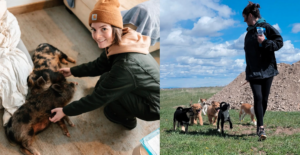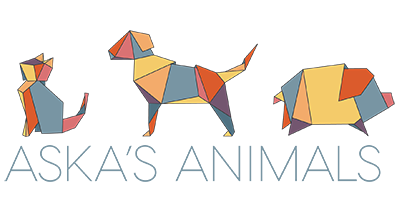Thank you for supporting Aska’s Animals in 2022! We grew because of you! Our mission is possible because you’ve donated, volunteered, and followed us on social media. With your help, we can continue to expand and help more homeless animals in our area.

As we reflect on 2022, we have so much to be grateful for…thanks to donors and volunteers like you,
- We added 2 new puppy palaces
- We housed 102 puppies
- We cared for 30 kittens
- We welcomed 6 pigs for long-term residence
- We used approximately 2,000 puppy pee pads
- We went through about 50 jars of peanut butter
- We hired our first part-time employee and started the process of hiring our first full-time employee
- We strengthened our relationship with regional shelters

The additional puppy palaces give us the space to say ‘yes’ to more homeless puppies and their moms, reducing the amount of overcrowding in our local shelters. Daily, we provide training, enrichment, and exposure to a variety of volunteers, so the puppies are well-adjusted and highly adoptable dogs entering the communities of these various partner programs. The thoughtful work we do in the first eight weeks of a puppy’s life support their family once they are adopted into new home.

Ali, our Animal Care Coordinator, joined our team this year. She has helped us increase our capacity for animals, increase our volunteer program and allowed our Board to push forward pressing items that are not just about picking up poop and managing day-to-day operations.
We hosted 3 free Dog Behavior Workshops with Krissi Goetz of JH Positive Training. Community members circled around the barn to learn about cortisol and the dog’s brain as well as to ask questions about their pets. We also hosted 6 Volunteer Orientations where members of the community got to learn about our mission, meet like-minded animal lovers and participate in the daily routines of Aska’s Animals.

We hosted our first Pig and Puppy Yoga thanks to the Animal Adoption Center in Jackson. 10 people soaked up the sun while stretching and hanging out with our long-term resident pigs in addition to our adoptable puppies. We have always imagined Aska’s Animals as a place for animal lovers to gather to enrich their lives and the animals’ lives. This event was a huge success, and we can’t wait to do more events like it in 2023.

We now have 11 long-term pig residents. Sometimes, people don’t know what they’re getting themselves into when they buy a pig as a family pet…we are grateful to be able to have the space and the support to allow pigs to live out their lives in a safe place where pigs can be pigs.

In 2022, we strengthened relationships with regional shelters. We added the Behavior Modification Program which allows us to provide dogs in local shelters a much-needed retreat to Aska’s Animals where they can de-stress in quiet accommodations and learn new skills, making them more adoptable. We also facilitated our first ‘trade’ with another animal rescue to provide behavioral support for two of our residents – a pig and a dog. This is a great reminder that although we want to provide temporary and (when needed) long-term housing for all homeless animals, sometimes, we aren’t the best place for the animal.

2022 was a fantastic year at Aska’s Animals. Thank you for your support. You play an essential role in our mission; to provide a progressive environment for animals through rehabilitation, adoption, education, and community outreach, and filling the critical gap between shelter and permanent rescue. We look forward to 2023 and the opportunity to expand our program!
Thank you,
Aska Shiratori-Langman
Founder & Board President




